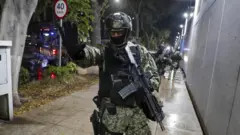The Mexican Drug War continues to cast a dark shadow over the nation, with the state of Sinaloa becoming a new epicenter of violence. Reports of disappearances in this region have alarmingly doubled as rival factions within the notorious Sinaloa cartel engage in a brutal power struggle, highlighting the ongoing challenges of organized crime in Mexico.
Official figures paint a grim picture: over 200 individuals have been reported missing in Sinaloa in just under three months. This spike directly correlates with the escalating conflict between two dominant factions vying for control of the Sinaloa cartel’s vast criminal empire. The current strife was ignited by the arrest of Ismael “El Mayo” Zambada in the United States. “Los Mayos” or “La Mayiza,” Zambada’s loyalists, believe he was betrayed by a son of the infamous Joaquín “El Chapo” Guzmán, the cartel’s founder. This accusation has fueled a bloody internal war, pitting “Los Mayos” against “Los Chapitos,” Guzmán’s sons’ faction.
The surge in violence and disappearances in Sinaloa has become a significant challenge for Mexico’s newly inaugurated President, Claudia Sheinbaum. Assuming office as Mexico’s first female president on October 1st, Sheinbaum inherited a complex security landscape. Despite campaigning on a platform of continuing her predecessor’s strategy of avoiding direct confrontations with cartels, the escalating situation in Sinaloa is demanding a more assertive response. Sheinbaum had previously stated, “There will be no return to the irresponsible drug war,” signaling a preference for less militaristic approaches. However, the dramatic increase in cartel-related violence is forcing a re-evaluation of this stance.
 A Mexican soldier in Sinaloa, a state grappling with increased violence due to cartel conflicts.
A Mexican soldier in Sinaloa, a state grappling with increased violence due to cartel conflicts.
Adding to the domestic pressure, the Mexican government is also facing increased scrutiny from the United States. President-elect Donald Trump has specifically targeted Mexico to enhance efforts in curbing the flow of fentanyl, a deadly synthetic opioid, into the US. This international pressure, combined with the escalating crisis in Sinaloa, has seemingly prompted a policy shift. President Sheinbaum recently declared a “zero tolerance” approach to combatting the violence.
In a public address, Sheinbaum lauded the Mexican security forces for a recent major success: the largest fentanyl seizure in the nation’s history. “This is an investigation that has been ongoing for a long time, and yesterday, it yielded these results. It is the largest seizure of fentanyl pills ever made,” she stated, highlighting the government’s commitment to tackling drug trafficking, a key aspect of the broader Mexican drug war.
Omar García Harfuch, Mexico’s top security official, announced via social media platform X (formerly Twitter) the scale of the fentanyl bust. The seized pills, discovered at two properties in Sinaloa, were estimated to be worth $394 million (£309 million) and weighed over a ton. Harfuch emphasized the ongoing nature of these operations, stating, “These actions will continue until the violence diminishes in the state of Sinaloa.” This large-scale drug seizure underscores the intense efforts to combat drug cartels, yet it also highlights the immense scale of the drug trade fueling the Mexican drug war.
The announcement of this significant fentanyl bust came shortly after Trump’s threat to impose substantial tariffs on goods from Mexico and Canada. Trump’s ultimatum explicitly linked these tariffs to Mexico’s ability to halt the flow of drugs and illegal immigration into the United States. This external pressure further complicates Mexico’s efforts to manage the multifaceted challenges of the drug war.
In what appears to be a related move to appease US concerns and demonstrate action against irregular migration, Mexican authorities announced the detention of over 5,200 migrants across the country. This large-scale detention occurred the day prior, coinciding with President Sheinbaum’s commitment to President-elect Trump to impede a migrant caravan heading north towards the US border. These actions indicate the intertwined nature of drug war strategies, migration control, and international relations in the context of US-Mexico policy.
The situation in Sinaloa and the broader context of the Mexican drug war remain critical. The internal cartel conflict, coupled with external pressures and the complexities of drug trafficking and migration, present formidable challenges for the Mexican government. The effectiveness of the “zero tolerance” approach and the long-term impact of these strategies on the Mexican drug war are yet to be seen.